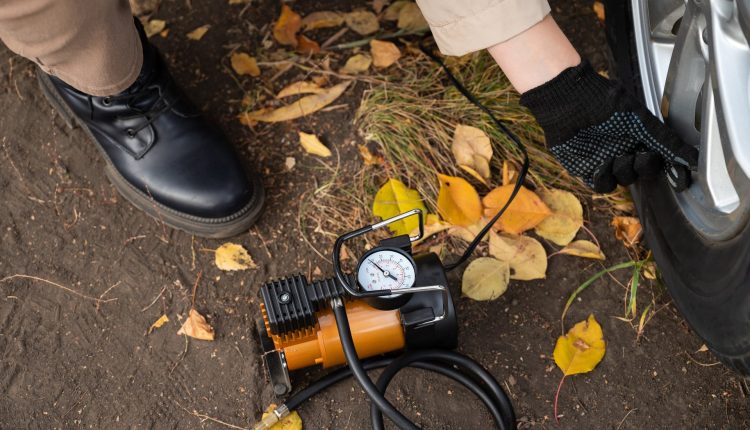Compact Tyre Inflators Or Petrol Station Pumps? Benefits & Drawbacks Explored
Key Takeaways
- Portable tyre inflators eliminate reliance on often broken or incorrectly calibrated petrol station pumps, providing 24/7 emergency preparedness wherever you are.
- UK petrol stations typically charge £1-2 per air top-up, whilst compact inflators offer unlimited use after a one-time purchase of £50-70.
- Modern portable inflators feature digital gauges with auto shut-off functionality, delivering superior accuracy compared to manual petrol station equipment.
- Properly maintained tyre pressure can improve fuel efficiency by up to 3%, saving money at the pump whilst extending tyre lifespan.
Every UK driver faces the same frustrating scenario: discovering a flat or underinflated tyre just when you need to be somewhere important. The traditional solution involves driving to the nearest petrol station, hoping their air pump works, and paying increasingly steep fees for what should be basic vehicle maintenance. Experts are exploring alternatives.
Why Portable Tyre Inflators Are Transforming Vehicle Maintenance
Automotive maintenance is changing – and everyday drivers are here for it. Portable tyre inflators address three fundamental pain points that have plagued UK motorists for decades: emergency preparedness, regular maintenance accessibility, and the unreliability of petrol station equipment.
Under-inflated tyres create poor handling characteristics, accelerated tyre wear, and significantly higher risks of catastrophic tyre failure. Research demonstrates that maintaining optimal tyre pressure extends tyre life, improves vehicle safety, and boosts fuel economy. Understanding the key differences between portable inflators and petrol station pumps helps drivers make informed decisions about their vehicle maintenance approach.
Petrol Station Pump Limitations UK Drivers Face Daily
1. Broken and Outdated Equipment Problems
UK petrol stations frequently feature air compressors that haven’t received proper maintenance in months or years. These machines suffer from worn components, damaged hoses, and faulty pressure gauges that provide wildly inaccurate readings. Many drivers discover these issues only after inserting their money – leaving them frustrated and unable to complete their tyre maintenance.
The mechanical wear on petrol station equipment creates safety hazards way beyond simple inconvenience. Incorrectly calibrated gauges can lead to dangerous over-inflation or inadequate under-inflation. Both scenarios compromise vehicle handling, increase accident risk, and accelerate premature tyre replacement costs.
2. Inconvenient Location and Operating Hours
Petrol station air pumps operate according to station hours – not necessarily during emergencies or early morning departures. Rural areas often lack nearby stations with functioning equipment, forcing drivers to travel considerable distances for basic tyre maintenance.
The fixed location constraint is particularly problematic during roadside emergencies. Drivers with flat tyres must either call expensive breakdown services or risk driving on dangerous underinflated tyres to reach the nearest functioning air pump. Neither choice is optimal.
3. Hidden Costs That Add Up Over Time
UK petrol stations increasingly charge £1-2 per air pump session, with some premium locations demanding even higher fees. Small charges? Maybe, but they accumulate rapidly for drivers who properly maintain monthly tyre pressure checks across four tyres.
The time-limited nature of pay-per-use systems creates additional stress and potential safety issues. Drivers rushing to complete inflation within the allocated timeframe often skip proper pressure verification, leading to inadequate maintenance that defeats the entire purpose of the exercise.
Compact Tyre Inflator Advantages for Everyday Drivers
1. 24/7 Emergency Preparedness Anywhere
Portable tyre inflators, meanwhile, eliminate dependency on external infrastructure, providing inflation capability wherever your vehicle travels. Whether facing an emergency puncture on a remote country road or discovering low pressure before an important early morning journey, compact inflators ensure you’re never stranded without solutions.
Battery-powered operation means these devices function independently of power sources, making them invaluable during roadside emergencies. Many models include integrated LED lighting and emergency SOS signals, turning a simple inflator into a complete roadside assistance tool.
2. Superior Accuracy with Digital Gauges and Auto Shut-Off
Modern portable inflators feature precise digital pressure displays that eliminate the guesswork associated with analogue petrol station gauges. Auto shut-off functionality allows users to set desired pressure levels and let the device handle the inflation process automatically, preventing dangerous over-inflation scenarios.
This precision is particularly valuable for vehicles requiring specific pressure settings or seasonal adjustments. Digital displays typically show real-time pressure readings in multiple units (PSI, BAR, kPa), accommodating different vehicle specifications and driver preferences.
3. Multi-Purpose Functionality Beyond Tyres
Quality portable inflators include multiple valve adapters, enabling inflation of bicycles, sports equipment, pool toys, and air mattresses. This versatility turns a single-purpose automotive tool into a household utility that serves many a need throughout the year.
The multi-functionality aspect also provides an excellent value proposition compared to purchasing separate inflators for different applications. Families with children can benefit from having one device that handles everything from car tyres to football inflation.
Speed Comparison: Portable vs. Petrol Station Inflation
Petrol Station Speed Advantage with Premium Portable Exceptions
It has to be said: traditional petrol station compressors deliver high-volume airflow that typically inflates car tyres faster than portable alternatives. Most station pumps can bring a completely flat tyre to proper pressure in 2-3 minutes, whilst standard portable inflators require 5-8 minutes for the same task.
However, some premium portable models can inflate compact car tyres from 30-35 PSI in approximately 3-5 minutes, significantly reducing the speed gap whilst maintaining all the convenience advantages of portable operation.
Battery Life Varies by Model and Tyre Size
Battery-powered inflators demonstrate varying performance depending on battery capacity, motor efficiency, and inflation requirements. Most quality devices can inflate 2-4 car tyres on a single charge, though larger tyres or completely flat conditions reduce this capacity significantly.
Cold weather conditions affect battery performance, reducing inflation speed and total capacity due to decreased chemical reaction rates in lithium-ion batteries. Drivers in northern regions or those frequently travelling in winter conditions should consider models with faster charging capabilities or dual power options – including 12V car adapters.
Long-Term Cost Analysis: Investment vs. Ongoing Fees
UK Petrol Station Charges vs. One-Time Purchase
It’s been mentioned that UK petrol stations charge £1-2 per inflation session – these are ongoing expenses that quickly exceed portable inflator purchase costs. Drivers performing monthly tyre pressure checks spend £12-24 annually on petrol station fees alone, whilst a quality portable inflator costs £50-70 as a one-time investment.
The break-even point typically occurs within 2-3 years of regular use (depending on usage frequency and local petrol station charges), after which the portable inflator provides completely free inflation services. This economic advantage is even more pronounced for households with multiple vehicles or drivers who perform frequent pressure checks.
Up to 3% Fuel Efficiency Savings from Optimal Pressure
Properly inflated tyres reduce rolling resistance, improving fuel economy by up to 3% according to automotive efficiency studies (though actual savings depend on driving habits and vehicle type). For average UK drivers covering 7,400 miles annually, this improvement translates to £20-35 in annual fuel savings at current petrol prices.
Under-inflated tyres also wear unevenly and require premature replacement, creating additional costs beyond fuel consumption. Maintaining optimal pressure through regular monitoring can significantly extend tyre lifespan, representing hundreds of pounds in avoided replacement costs over the vehicle’s lifetime.
Modern Devices Deliver Value for UK Drivers
Contemporary portable tyre inflators represent a compelling solution for UK drivers seeking convenience, reliability, and long-term cost savings. The combination of 24/7 availability, superior accuracy, and multi-purpose functionality creates significant value compared to traditional petrol station dependency.
The initial investment in a quality portable inflator pays dividends through eliminated petrol station fees, improved fuel efficiency, and improved vehicle safety. For drivers prioritising convenience and emergency preparedness, portable inflators offer clear advantages over traditional inflation methods.
Premium portable tyre inflators like AutoPump are designed specifically for such priorities.


Comments are closed.